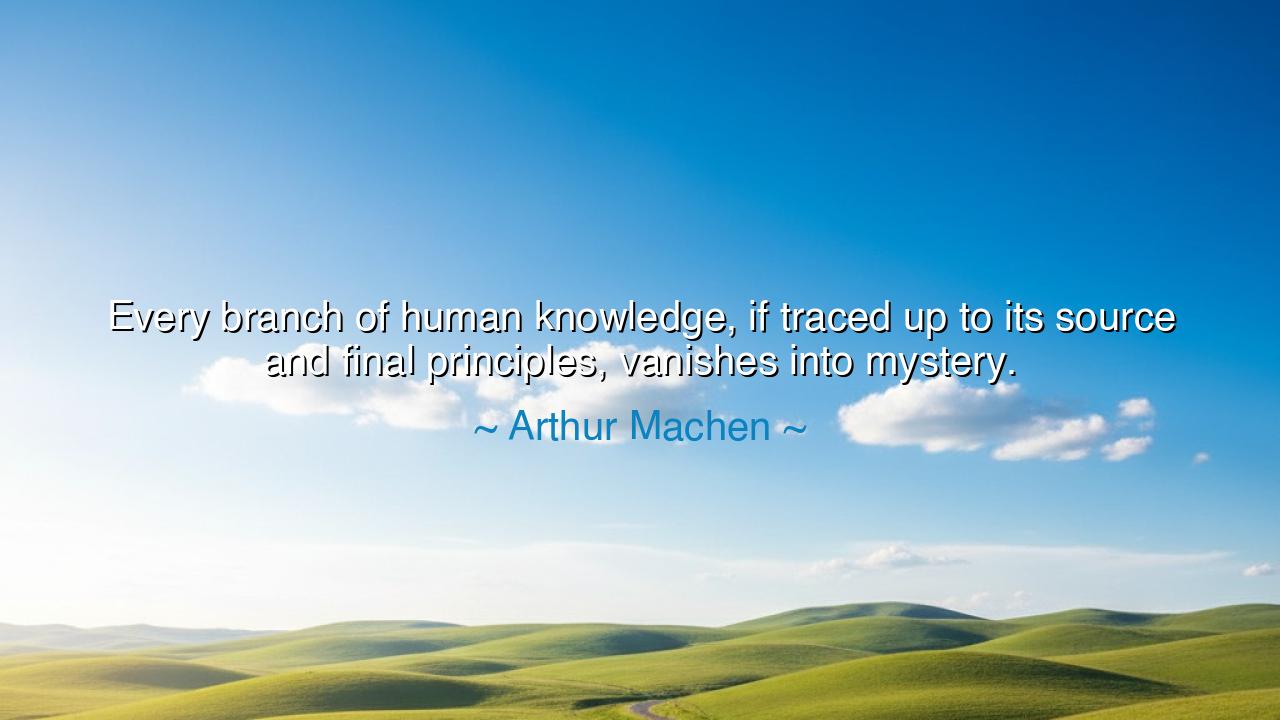
Every branch of human knowledge, if traced up to its source and
Every branch of human knowledge, if traced up to its source and final principles, vanishes into mystery.






When Arthur Machen declared, “Every branch of human knowledge, if traced up to its source and final principles, vanishes into mystery,” he was unveiling a truth that humbles even the greatest minds: that knowledge, though vast, is finite, while mystery is eternal. His words are not a rejection of learning, but a reverent acknowledgment that beyond every discovery lies another veil, another question, another realm of wonder we cannot name. Machen, both mystic and thinker, understood that the deeper one peers into the structure of existence — the more one learns of science, philosophy, and art — the clearer it becomes that all paths of knowledge end not in certainty, but in awe.
The origin of this insight is found in Machen’s own life and writings. A Welsh author of the late nineteenth and early twentieth centuries, he lived in a time when science seemed to be explaining everything — evolution, matter, the stars. Yet Machen saw, as few did, that reason alone could not reach the roots of reality. His fascination with the unseen — with faith, myth, and the supernatural — led him to perceive that knowledge is like a torchlight in a vast cavern: it reveals only what lies within its reach, while the greater darkness beyond remains untouched. To him, this was not a tragedy, but the foundation of all beauty — for the unknowable is what gives life its depth and holiness.
In the ancient world, this wisdom was known by the sages. The Oracle of Delphi proclaimed, “Know thyself,” not as an invitation to mastery, but as a reminder of human limitation — that to know oneself is to encounter the mystery that dwells within. Socrates, greatest of the philosophers, declared that his wisdom consisted in knowing that he knew nothing. These words mirror Machen’s revelation: the more deeply we inquire into the foundations of knowledge — whether of matter, spirit, or meaning — the more we confront the boundless mystery from which all things arise. To understand the limits of understanding is not defeat; it is illumination.
History too bears witness to this pattern. When Isaac Newton unraveled the laws of motion, he imagined he had glimpsed the machinery of the universe. Yet at the end of his life, he confessed, “I do not know what I may appear to the world, but to myself I seem to have been only like a boy playing on the seashore… while the great ocean of truth lay all undiscovered before me.” From the alchemists of the past to the physicists of the present, all who chase knowledge to its horizon find the same truth that Machen described — that beyond the borders of reason lies the infinite, and that mystery is not the enemy of knowledge, but its source.
Machen’s words carry a deeper moral as well. In our age, humanity has grown proud of its intellect, believing that data, technology, and analysis can solve every problem, answer every question, and even conquer death itself. Yet Machen reminds us that the soul of the world cannot be dissected by logic, nor can wonder be measured in formulas. The ancient poets understood that knowledge without reverence is sterile. It gives us tools but not wisdom, power but not peace. To stand before mystery with humility is to remember that the mind is only one part of the human being — the heart, the spirit, and the imagination complete the rest.
This truth can be seen in every field. The scientist reaches a point where physics dissolves into paradox; the philosopher finds that logic leads to silence; the artist discovers that beauty cannot be explained, only felt. In each case, the end of knowing is the beginning of worship. When Machen says that knowledge “vanishes into mystery,” he means that the further we ascend the mountain of truth, the more we realize that the summit disappears into the clouds — and yet, that is what makes the climb worthwhile. For it is in that vanishing that we glimpse eternity.
And so, the lesson is timeless: seek knowledge, but never forget wonder. Study the world, but bow before its mystery. Ask questions boldly, but accept that some answers lie beyond words. In every field — science, faith, art, or life — let humility guide you, for the wise know that the unknown is not emptiness, but fullness too vast for the mind to hold. As Arthur Machen teaches, the end of all knowledge is not despair, but reverence — for when reason reaches its limit, the soul awakens to the infinite.






AAdministratorAdministrator
Welcome, honored guests. Please leave a comment, we will respond soon